Related Research Articles

ACT New Zealand, known simply as ACT, is a right-wing, classical-liberal political party in New Zealand. According to former party leader Rodney Hide, ACT's values are "individual freedom, personal responsibility, doing the best for our natural environment and for smaller, smarter government in its goals of a prosperous economy, a strong society, and a quality of life that is the envy of the world". Young ACT is its affiliated, albeit unofficial, student wing.
New Zealand First, commonly abbreviated to NZ First, is a nationalist and populist political party in New Zealand. The party formed in July 1993 following the resignation on 19 March 1993 of its leader and founder, Winston Peters, from the then-governing National Party. Peters had been the sitting Member of Parliament for Tauranga since 1984 and would use the electorate as the base for New Zealand First until consecutive defeats by National Party candidates in 2005 and 2008. It has formed coalition governments with both major political parties in New Zealand: first with the National Party from 1996 to 1998 and then with the Labour Party from 2005 to 2008 and from 2017 to 2020. Peters has served on two occasions as deputy prime minister.
The Alliance was a left-wing political party in New Zealand. It was formed at the end of 1991 by the linking of four smaller parties. The Alliance positioned itself as a democratic socialist alternative to the centre-left New Zealand Labour Party. It was influential throughout the 1990s, but suffered a major setback after its founder and leader, Jim Anderton, left the party in 2002, taking with him several of its members of parliament (MPs). After the remaining MPs lost their seats in the 2002 general election, some commentators predicted the demise of the party.

The Marijuana Party is a Canadian federal political party, whose agenda focuses on issues related to cannabis in Canada. Apart from this one issue, the party has no other official policies, meaning party candidates are free to express any views on all other political issues. Passage of the Cannabis Act in June 2018 legalized cannabis on 17 October 2018.
United Future New Zealand, usually known as United Future, was a centrist political party in New Zealand. The party was in government between 2005 and 2017, first alongside Labour (2005–2008) and then supporting National (2008–2017).
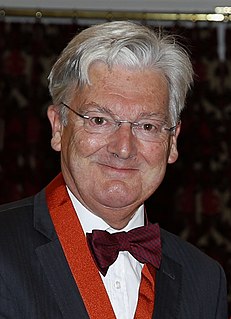
Peter Francis Dunne is a retired New Zealand politician who was the Member of Parliament (MP) for Ōhāriu. He held the seat and its predecessors from 1984 to 2017—representing the Labour Party in Parliament from 1984 to 1994, and a succession of minor centrist parties from 1994. He was the Leader of Future New Zealand from 1994 to 1995, United New Zealand from 1996 to 2000, and United Future from 2000 to 2017.

The Workers Party of New Zealand was a socialist political party in New Zealand. It published a monthly magazine called "The Spark". In February 2013 the party was transformed from a "mass workers party" to a "fighting propaganda group". The organisation was renamed to Fightback.

Nándor Steven Tánczos is a New Zealand social ecologist, researcher, educator, activist and political commentator. He is currently a councillor in the Whakatāne District. He is also co-director of He Puna Manawa social and political change agency.

Laila Jane Harré is a New Zealand politician and trade unionist. She was the first leader of the Internet Party, and stood for Parliament in the 2014 general election through the Helensville electorate. From 1996 to 2002, she was a Member of Parliament for the Alliance party, briefly leading that party after the group experienced a schism in 2002.

David Richard Cunliffe is a New Zealand management consultant and former politician who was Leader of the New Zealand Labour Party and Leader of the Opposition from September 2013 to September 2014. He was Member of Parliament (MP) for Titirangi and then New Lynn for the Labour Party between 1999 and 2017. He served as the Minister of Health, Minister for Communications and Information Technology and Minister of Immigration for the Fifth Labour Government of New Zealand from October 2007 until November 2008.

The New Zealand electoral system has been mixed-member proportional (MMP) since the 1996 election. MMP was introduced following a referendum in 1993. It replaced the first-past-the-post (FPP) system New Zealand had previously used for most of its history. New Zealanders elect their members of parliament (MPs) with two votes. The first vote is for a candidate from an electorate. The second vote is used to elect ranked party lists.
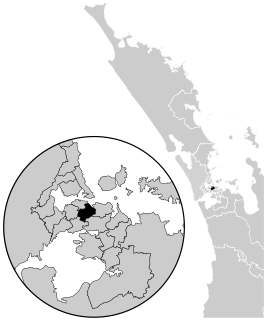
Epsom is a New Zealand parliamentary electorate, returning one Member of Parliament to the New Zealand House of Representatives. As of the 2017 general election, its member of parliament is David Seymour.

Mount Albert is a parliamentary electorate based around the suburb of Mount Albert in Auckland, New Zealand, returning one member of Parliament (MP) to the House of Representatives. It has elected only Labour Party MPs since it was first contested at the 1946 election. The incumbent MP is Jacinda Ardern, currently serving as Prime Minister of New Zealand, who was first elected in a 2017 by-election. The electorate was previously represented by David Shearer from 13 June 2009 to 31 December 2016; it was represented by Helen Clark from the 1981 general election until her resignation from Parliament on 17 April 2009.

Napier is a New Zealand parliamentary electorate, returning one Member of Parliament to the House of Representatives. It is named after the city of Napier, the main urban area within the electorate. The electorate was established for the 1861 election and has existed since. Since the 2014 general election, Napier has been held by Stuart Nash of the New Zealand Labour Party. Previously, it had been held by Chris Tremain of the New Zealand National Party, who stood down prior to the 2014 election.
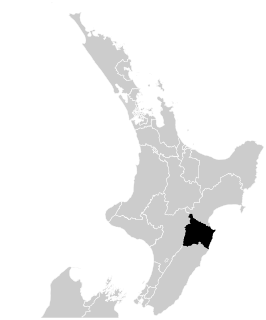
Tukituki is a New Zealand parliamentary electorate, returning one Member of Parliament to the New Zealand House of Representatives. Named after the Tukituki River which runs through the electorate, it was established for the 1996 general election and has existed since. The current MP for Tukituki is Anna Lorck of the Labour Party, who won the seat from the National Party's Lawrence Yule at the 2020 general election.
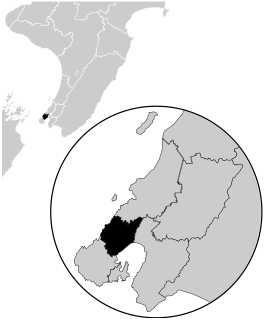
Ōhāriu, previously spelled Ohariu and then Ōhariu, is a New Zealand parliamentary electorate returning one Member of Parliament to the House of Representatives. It first existed from 1978 to 1993, and was recreated for the 2008 election. In 2008, it was the successor to Ohariu-Belmont, first contested at the first mixed-member proportional (MMP) election in 1996. Through its existence Ohariu-Belmont was represented by Peter Dunne, leader of the United Future party. Dunne contested and won the recreated electorate in 2008. He announced on 21 August 2017, he would not be seeking re-election in the 2017 general election.
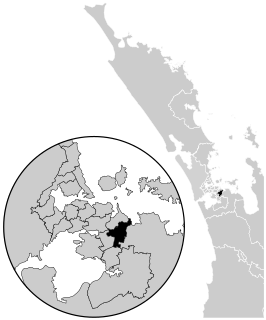
Botany is a New Zealand parliamentary electorate, returning one Member of Parliament to the New Zealand House of Representatives. It was contested for the first time at the 2008 general election, and won by Pansy Wong for the National Party. Following Wong's resignation in late 2010, a by-election returned Jami-Lee Ross, who was confirmed by the voters in the 2011 general election. Ross left the National Party in October 2018 and became an independent.

Grant Murray Robertson is a New Zealand politician and member of the Labour Party who has served as the 19th deputy prime minister of New Zealand since 2020 and the minister of Finance since 2017. He has served as Member of Parliament (MP) for Wellington Central since 2008.

The 2011 New Zealand general election on Saturday 26 November 2011 determined the membership of the 50th New Zealand Parliament.
References
- ↑ "New Zealand 2005 general Election: Summary of Overall Results". Archived from the original on 20 March 2008. Retrieved 27 April 2008.
- ↑ "Small parties die". No Right Turn. 28 June 2008. Retrieved 28 June 2008.